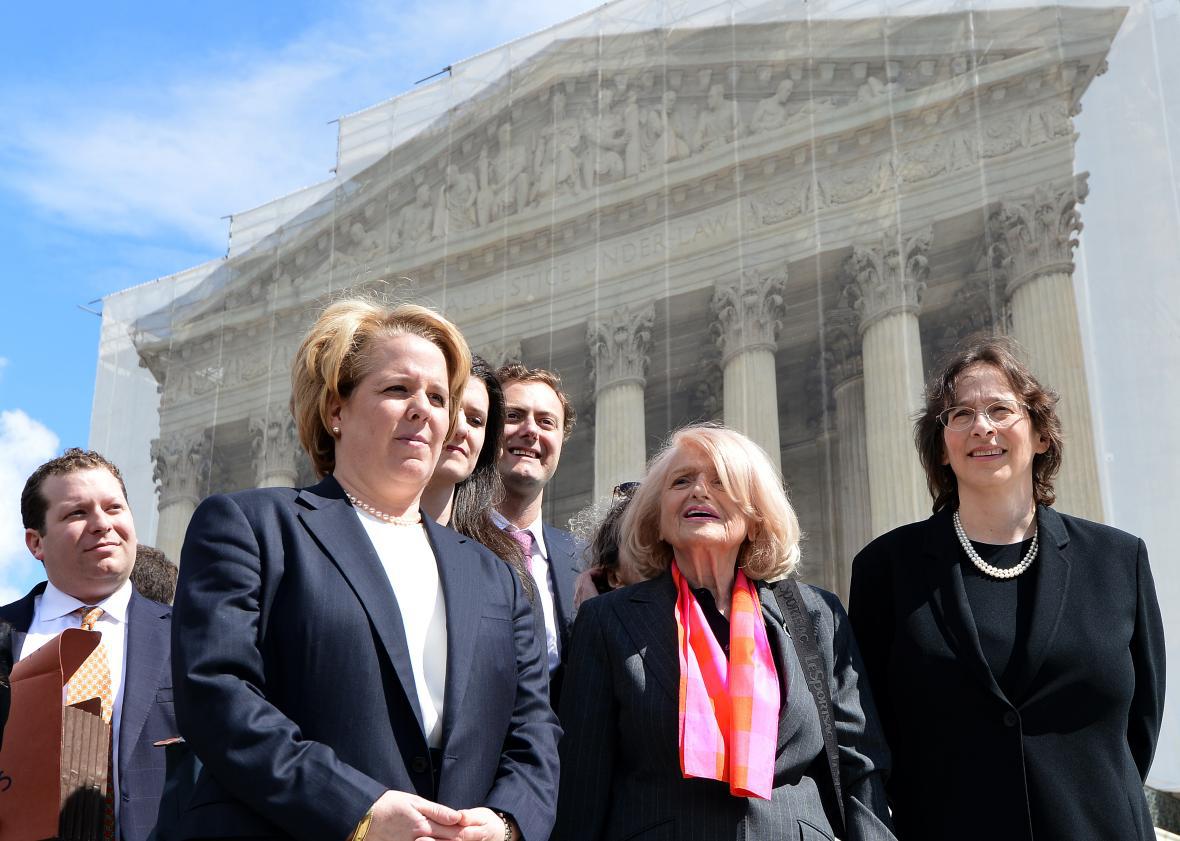Ted Cruz recently gave his supporters a belated Christmas present when he announced that he planned to re-introduce a bill called the First Amendment Defense Act. Like other opponents of LGBTQ equality, Cruz has come to realize that rather than denigrating the common humanity of gay and transgender people, or trying to overrule the Supreme Court’s decision in Obergefell v. Hodges, they are better off using religion as their weapon of choice.
Although their bill is labeled the First Amendment Defense Act, it is flatly inconsistent with the language of the First Amendment, which states in pertinent part that “Congress shall make no law respecting an establishment of religion.” The problem with FADA is that not only does it authorize—even encourage—discrimination against LGBTQ people, but it “establishes” only some religions and some religious views, not the religions or religious views of many others. Believe me, I know—my clients, the Campaign for Southern Equality and Episcopal Vicar Susan Hrostowski, have been fighting a similar law (HB 1523) passed in Mississippi.
Like FADA, at the heart of HB 1523 is the identification of the following as the official religious beliefs of Mississippi: 1) “marriage is or should be recognized as the union of one man and one woman”; and 2) “sexual relations are properly reserved to a marriage between one man and one woman.” HB 1523 then allows government officials, businesses, and private citizens to do a whole lot of otherwise illegal and offensive stuff so long as it is “consistent with” one of these beliefs.
Among other things, HB 1523 permits businesses to refuse to provide “accommodations, facilities, or goods” as long as they relate to the “solemnization, formation, celebration, or recognition” of a marriage. Thus, a restaurant manager in Jackson, Mississippi, who chooses not to “recognize” the marriage of the Rev. Hrostowski would be empowered to refuse to seat her, her wife, and their teenage son together at a table on their wedding anniversary. When I was a kid, my grandmother told me about driving into a small town late at night on her honeymoon with my grandfather in the late 1930s only to find a sign at the check-in counter of the only hotel saying “no Jews allowed.” HB 1523 is the contemporary equivalent of that.
HB 1523 also allows private citizens to refuse to provide counseling and psychological treatment in clear violation of professional guidelines. This provision of HB 1523 is arguably the most dangerous since it would allow a psychologist to stop therapy with a suicidal high-school student who divulges that he thinks he might be gay. One of our witnesses, who was born and spent most of her life in Mississippi, testified that she did not know whether she “would still be here today” if, when she was first coming out as a lesbian, her psychologist had stopped her treatment because of such a religious belief.
So what do a bunch of lawyers from New York City do when they want to prove the unconstitutionality of a Mississippi law in a Mississippi court? We did what any New Yorker would do under the circumstances. We found ourselves a rabbi—Jeremy Simons, “a circuit-riding” rabbi, who travels throughout 13 Southern states providing rabbinical services to communities that do not have their own rabbi.
Rabbi Simons testified that none of the religious beliefs in HB 1523 are held by the vast majority of American Jews. When asked about his own religious beliefs, Rabbi Simons testified as follows: “I think that they can be summed up by Genesis, where in the creation story we read that humanity was created in b’tzelem elohim, in the image of God. For me, the divine holiness of every human being is central. We talked about Leviticus and the prohibitions against male homosexual acts that are found in Chapters 18 and Chapters 20. [But] if you look in between those two chapters, in Chapter 19, you find the commandment ‘You shall love your neighbor as yourself.’ That idea of respecting those around us is central to my Judaism.” In response to a question about marriage, Rabbi Simons explained: “When a Jewish couple is married, it takes place under the chuppah, meant to symbolize the couple’s home, but it has to be open on all four sides. Part of that is so people can see that the couple is really there, but the deeper meaning is that the entire community is invited to be a part of this marriage and that anyone ought to be able to see themselves underneath that canopy and have the right to be there.”
But probably the most dramatic moment of Rabbi Simons’ testimony came when he explained the impact of HB 1523 on himself: “On the one hand, it makes me feel very upset that my religion is seen as somehow less legitimate because I cannot identify with the religious beliefs [of HB 1523]. On the other hand, it makes me very angry because I consider myself a religious person with deeply held religious beliefs. And by God, if someone were to assume that I believe anything that is in this statute, that is a tragedy that I have to explain. This is not me and this is not my religion.” There was not a dry eye in the courtroom when Rabbi Simons said those words.
So that was the testimony of a Jewish rabbi in a Mississippi courtroom in a case about LGBTQ civil rights in 2016. You probably won’t be surprised to learn that, given testimony like that, we won our case at the trial court. Federal district court judge Carlton Reeves struck down HB 1523 as unconstitutional and prevented it from going into effect. Our case is currently on appeal at the U.S. Court of Appeals for the 5th Circuit. While I am confident that the 5th Circuit will affirm, I am equally confident that thanks to people like Ted Cruz, this will be the first of many battles to come.
